
The decision comes just a day before the bloc is set to discuss new aid to Kiev and accession talks opposed by Budapest

FILE PHOTO. © Global Look Press / Zhao Dingzhe
The EU Commission announced it was releasing billions of euros in cohesion funds for Hungary and declared that its government had taken relevant steps to ensure judicial independence on Wednesday. Its statement came just a day before the bloc’s leaders were scheduled to discuss new aid for Kiev and its prospects of acceding to the EU – which Hungary opposed.
Last December, Brussels froze €22 billion ($23 billion) in funds allocated to Budapest, citing concerns over the independence of judges in Hungary and the nation’s failure to comply with the EU Charter of Fundamental Rights on issues including LGBTQ rights, academic freedom, and asylum.
In May, Hungary reached a preliminary deal with the EU on its judicial reforms. On Wednesday, the EU Commission stated that it “considers that Hungary has taken the measures it committed to take.” The nation “may start claiming reimbursements of up to around €10.2 billion ($11.09 billion),” it added.
Brussels also vowed to “closely and continuously monitor” Hungary’s compliance with the bloc’s rules, adding that it could freeze the funds again if it finds Budapest in breach of its rule of law regulations again. It also said that Hungary has not yet addressed similar issues in the fields of “public procurement, prosecutorial action, conflict of interest, the fight against corruption and public interest trusts,” adding that the remaining funds allocated for Budapest would remain frozen.

Read more
The decision came ahead of the European Council Summit, which is scheduled to be held between December 14 and 15. The summit’s agenda includes further aid to Ukraine and the issue of opening accession talks for Kiev.
Earlier on Wednesday, Hungarian Prime Minister Viktor Orban said that Budapest would only drop its opposition to the latest EU aid package for Ukraine if Brussels unfroze all the funds earmarked for his nation. Earlier, Orban repeatedly stated that Brussels’ aid to Kiev had led to no tangible results amid its continued conflict with Russia.
The EU is seeking to approve a four-year, €50 billion ($54 billion) package to help Kiev in the conflict with Moscow.
Asked about the timing of the EU Commission’s decision, its Vice President for Values and Transparency Vera Jourova told journalists in Strasbourg on Tuesday that it was “pure coincidence that it’s exactly the same time as the European Council.”
Since the beginning of the Russian military operation in Ukraine, Orban has taken a different position from that of the EU and its allies. He has repeatedly criticized sanctions against Russia, refused to send weapons to Ukraine, and called on Brussels to persuade Moscow and Kiev to engage in peace talks instead of fighting.




